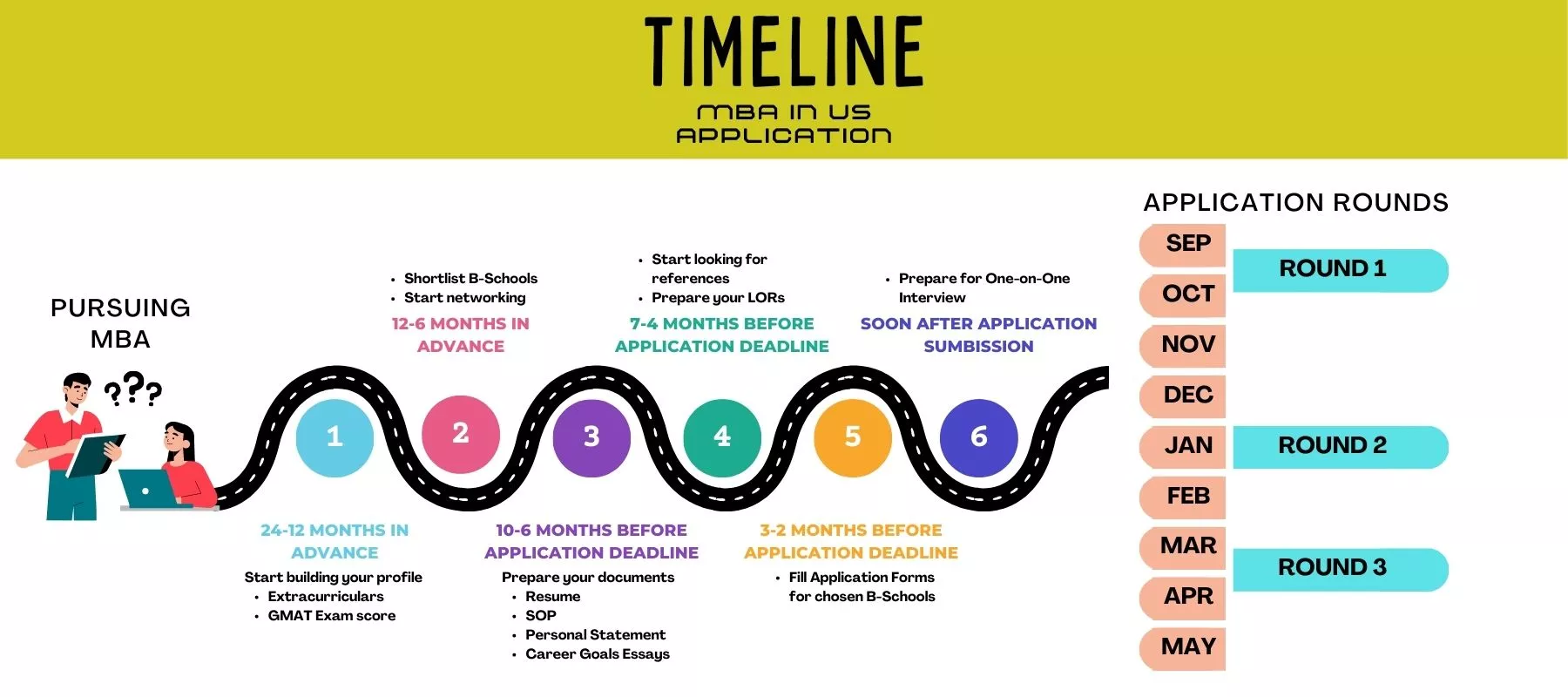Best MBA programs for Aspiring Business Leaders

Is Wall Street your dream career destination? Are you an aspiring business leader looking to acquire essential management and strategic thinking skills? Do you want to accelerate your career progression? Are you looking for a career change? Would you like to expand your existing business and gain valuable insights for your venture?
If you answered ‘yes’ to any of the above questions, then pursuing an MBA degree may be the ideal path for you.
The Master of Business Administration (MBA) has become a prestigious and highly sought-after qualification for those looking to excel in the world of business and entrepreneurship. Choosing to pursue an MBA degree in the United States offers numerous compelling reasons, as the US stands as a global hub for business and innovation, housing some of the world’s most renowned and cutting-edge B-schools.
Let’s explore the reasons why pursuing an MBA from the US can be a life-changing and enriching experience.
1. World-Class Business Education: The US is renowned for having some of the best B-schools in the world. Pursuing an MBA in the US provides access to high-quality education, expert faculty, and a comprehensive curriculum that covers various aspects of business and management. This exposure to top-notch education can significantly enhance your knowledge and skill-set, preparing you to excel in the dynamic and competitive global business environment.
2. Diverse and Stimulating Learning Environment: US MBA programs often attract students from all over the world, creating a diverse and culturally rich learning environment. Interacting with classmates from different backgrounds and experiences can broaden your perspectives and help you develop cross-cultural communication and collaboration skills, essential in today’s interconnected business world.
For example: Harvard Business School’s “case method” approach, Duke University’s Fuqua School of Business’ “Team Fuqua” program, and MIT Sloan’s cross-cultural exchange and collaboration ensure a holistic and transformative learning experience.
3. Extensive Networking Opportunities: B-schools in the US offer numerous networking opportunities, including industry events, career fairs, and guest speaker sessions. Building a strong professional network during your MBA can open doors to internships, job opportunities, and valuable industry connections, ultimately contributing to your long-term career success.
For example: The Wharton School’s global reach and Kellogg School of Management’s extensive alumni network provide exceptional networking opportunities for students.
4. Experiential Learning and Real-World Projects: Many US MBA programs emphasize experiential learning through internships, consulting projects, and business simulations. These opportunities allow you to apply theoretical concepts to real-world scenarios, honing your problem-solving and decision-making abilities and giving you a taste of what to expect in your future career.
For example: Ross School of Business provides students with opportunities for experiential learning through the Multidisciplinary Action Projects (MAP) program. Likewise, UCLA Anderson School of Management offers hands-on learning experiences through its Applied Management Research (AMR) program.
5. Access to Thriving Business Community: The US boasts a thriving business environment with numerous multinational corporations, startups, and innovative ventures. Being in close proximity to these companies can provide exposure to the latest business trends, innovative practices, and entrepreneurial opportunities, making the US an ideal place to learn and grow in the business world.
For example:NYU Stern’s location in one of the world’s financial capitals offers ample networking opportunities and access to industry events. Similarly, Stanford Graduate School of Business’ proximity to Silicon Valley’s entrepreneurial ecosystem contributes to a cutting-edge educational experience.
Top B-Schools in the US
According to the QS Rankings, over 50 of the finest B-schools in the United States are internationally recognized as top-tier institutions for their MBA programs. Below are listed a few of the leading MBA colleges in the USA.
- Harvard Business School (Harvard University) – Boston, Massachusetts
- Stanford Graduate School of Business (Stanford University) – Stanford, California
- The Wharton School (University of Pennsylvania) – Philadelphia, Pennsylvania
- Booth School of Business (University of Chicago) – Chicago, Illinois
- Sloan School of Management (Massachusetts Institute of Technology) – Cambridge, Massachusetts
- Kellogg School of Management (Northwestern University) – Evanston, Illinois
- Columbia Business School (Columbia University) – New York, New York
- Tuck School of Business (Dartmouth College) – Hanover, New Hampshire
- Haas School of Business (University of California, Berkeley) – Berkeley, California
- Yale School of Management (Yale University) – New Haven, Connecticut
Different Types of MBA Degree Program
Below is a table that outlines the different types of MBA programs and common specializations offered by top MBA colleges in the United States:
| MBA Program Type | Description |
| Full-Time MBA | Traditional two-year program with a comprehensive curriculum, ideal for career changers or those seeking in-depth business education. |
| Part-Time MBA | Designed for working professionals, allowing them to continue working while pursuing their MBA on a flexible schedule. |
| Executive MBA (EMBA) | Tailored for experienced executives and senior professionals to enhance leadership and executive management skills. |
| Online MBA | Offers flexibility for remote learning, suitable for individuals who need to balance work, family, and education. |
| Global/International MBA | Emphasizes international business and cultural exposure, often includes international study trips and exchange programs. |
Common Specializations
| MBA Specializations | Description |
| Finance | Focuses on financial management, investments, and corporate finance. |
| Marketing | Concentrates on product development, branding, and market strategy. |
| Entrepreneurship | Prepares students to start and manage new ventures and foster innovation. |
| Technology Management | Focuses on the management of technology-driven organizations. |
| Healthcare Management | Specialized program for managing healthcare organizations and healthcare systems. |
| Human Resources | Concentrates on managing talent, employee relations, and organizational development. |
| Sustainable Business | Focuses on integrating sustainability and environmental responsibility into business strategies. |
| Real Estate | Concentrates on real estate investment, development, and property management. |
| International Business | Prepares students for global business environments and international markets. |
| Business Analytics | Focuses on data-driven decision-making and analysis in business operations. |
| Social Impact/Nonprofit Management | Specialized program for careers in the nonprofit sector and social entrepreneurship. |
It’s important to note that the specific types and specializations offered may vary from one MBA college to another. Prospective students should research individual universities to find the programs that align with their career goals and interests.
Application Timeline
The MBA application process typically begins at least one year before the commencement of the degree program. Please refer to the diagram below to understand the MBA application timeline and different deadlines.

Admission Requirements
The admission requirements for pursuing an MBA in the USA involve the assessment of applicants based on several factors. Here are some fundamental criteria that international students need to meet:
1. Academic Qualifications: To be eligible, you should have completed 16 years of education, which can be achieved through a 10+2+4 educational system or by graduating from a four-year bachelor’s program. Please check the university website before applying as some of the universities have started accepting three year degrees like BCom, BBA, BFA etc.
2. Standardized Exam Scores: Most business schools in the USA typically require a competitive GMAT score for admission. Some institutions may also consider GRE scores as equivalents.
3. Language Proficiency: International applicants must demonstrate their English language proficiency by submitting scores from standardized tests like TOEFL, IELTS, PTE, or equivalent exams.
4. Work Experience: Generally, applicants are expected to have at least three years of work experience to study for an MBA in the USA. However, this requirement may vary depending on the university and the specific MBA program chosen.
5. Admission Interviews: Interviews are an integral part of the MBA admission process as B-schools are looking for college ready candidates, with skills like leadership, global mindset, teamwork, understanding of one’s environment, and self-awareness, who can thrive in the university and beyond.
Tuition Fees
The cost of studying an MBA degree program in the USA can vary significantly depending on factors such as the university’s reputation, location, program duration, and the student’s residency status. For international students, the costs are generally higher, with fees ranging from $50,000 to $130,000 or more per year. Additionally, students should consider living expenses, books, health insurance, and other associated costs, which can add to the overall expense. However, many universities offer financial aid, scholarships, and assistantship opportunities to help alleviate the financial burden for deserving students.
Career Prospects for MBA graduates
Pursuing an MBA from a US university can open up numerous lucrative career prospects across various industries. The salary and job opportunities can vary based on factors like the specific MBA specialization, the reputation of the university, work experience, and individual skills. Average salaries for entry-level MBA graduates from top B-schools can range from $80,000 to $120,000, and with experience, it can go well above $200,000 per year. Below are some examples of potential career paths:
1. Management Consultant: Management consultants provide strategic advice to businesses to improve their performance and efficiency. Companies like McKinsey & Company, Bain & Company, and Boston Consulting Group are top-tier consulting firms that hire MBA graduates.
2. Investment Banker: MBA graduates often join investment banks as associates, helping clients with financial services, mergers and acquisitions, and capital raising. Top investment banks such as Goldman Sachs, JP Morgan, and Morgan Stanley recruit MBA talent.
3. Marketing Manager: MBA graduates can pursue careers as marketing managers, overseeing marketing strategies and campaigns. Companies like Procter & Gamble, Google, and Johnson & Johnson hire MBA graduates for marketing roles.
4. Product Manager: Product managers are responsible for developing and launching products. Tech companies like Amazon, Apple, and Microsoft often recruit MBA graduates for product management roles.
5. Operations Manager: Operations managers are responsible for streamlining processes and improving efficiency in organizations. Companies like GE, Walmart, and UPS offer opportunities for MBA graduates in operations management roles.
All in all, pursuing an MBA degree is a personal decision as it demands huge investment of time, money, and effort. Nevertheless, attending a prestigious B-school in the US provides a unique and life-changing journey that enables you to reach greater professional heights. In short, if you envision yourself on the cover of Forbes Magazine or in a window office with a view of Manhattan’s bustling streets then pursuing an MBA is undoubtedly a worthwhile endeavour in every sense.

 Previous Post
Previous Post Next Post
Next Post
